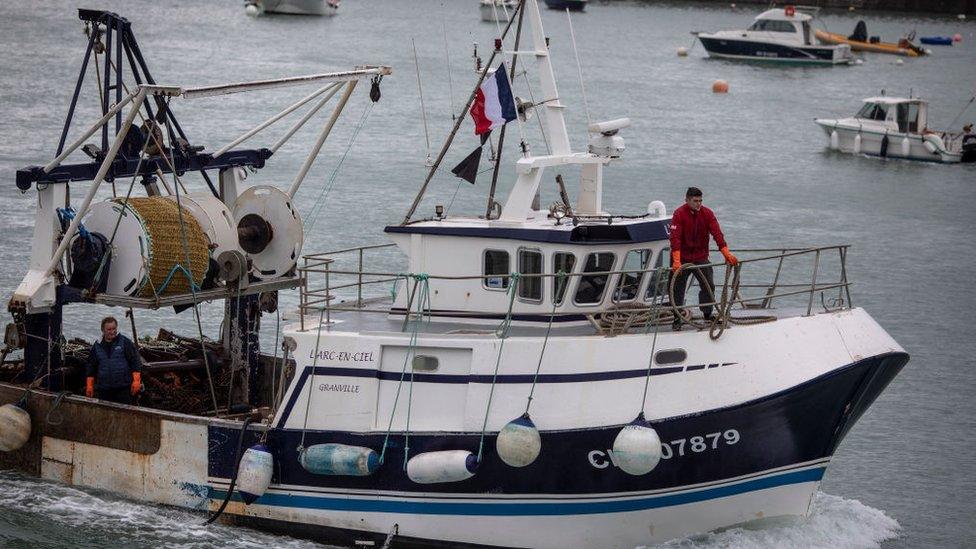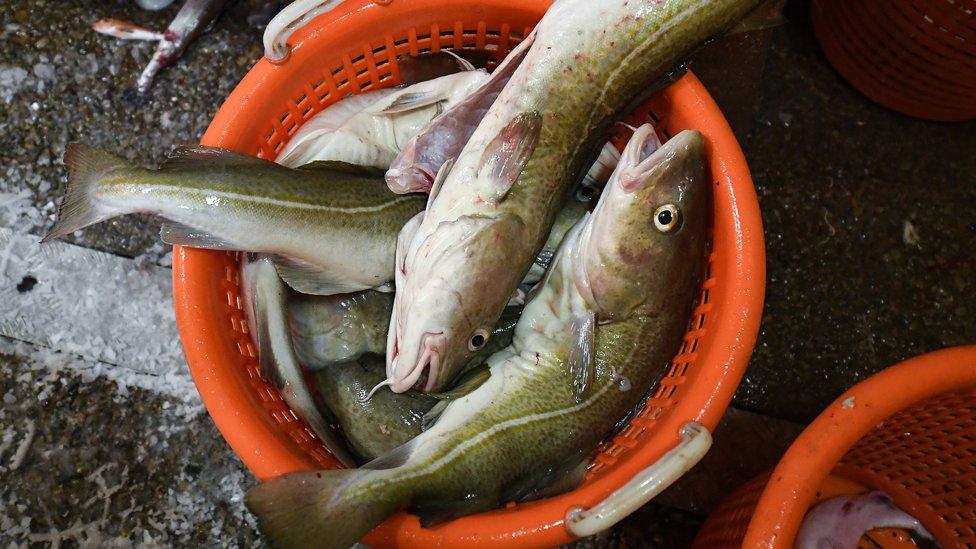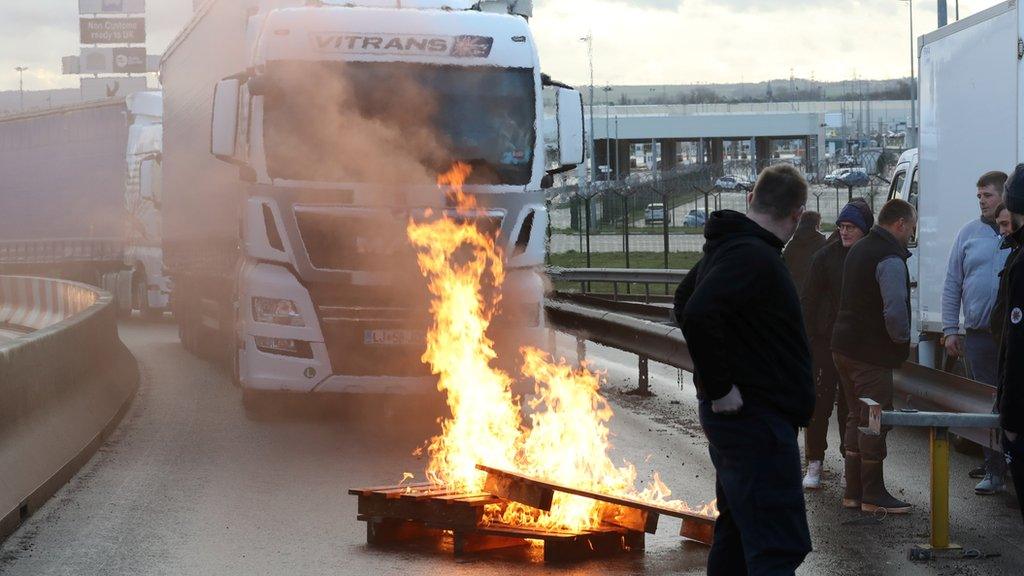Fishing row a test of UK's credibility - Macron
- Published

The fishing row began after the UK and Jersey rejected dozens of licences for French boats to fish in their waters
Emmanuel Macron has raised tensions with Britain by warning that the dispute over fishing rights is a test of the UK's global credibility.
Mr Macron told the Financial Times, external that UK backpedalling on Brexit commitments "is not a big sign of... credibility".
It comes amid a UK-France dispute over post-Brexit fishing rights.
PM Boris Johnson said the UK would do "whatever is necessary to ensure UK interests", and that he fears the EU-UK trade agreement may have been breached.
The argument, which began when the UK and Jersey denied fishing licences to dozens of French boats last month, is essentially over how many French fishing boats are allowed to fish in UK waters.
The French president - referring to the fishing row and disputes over Northern Ireland - spoke out ahead of the G20 summit in Rome, which sets the stage for the COP26 climate summit.
Mr Macron said: "Make no mistake, it is not just for the Europeans but all of their partners.
"Because when you spend years negotiating a treaty and then a few months later you do the opposite of what was decided on the aspects that suit you the least, it is not a big sign of your credibility."
France has said it could stop UK boats landing in its ports if the row over licences is not resolved.
On Friday, Brexit minister Lord Frost told the EU the government could launch "dispute settlement proceedings" if France went ahead with its threats over the fishing row.
Threats to "disrupt UK fisheries and wider trade, to threaten energy supplies... would put the European Union in breach of the Trade and Cooperation Agreement," No 10 said.
Meanwhile, the BBC has seen a letter that appears to show the French Prime Minister Jean Castex appealing to the EU to demonstrate there is "more damage to leaving the EU than to remaining there".
The letter says it is necessary that the EU shows its "total determination" to get the UK to stick to the agreements it has made on fishing and to "re-establish trust".
"It is essential to clearly show to European public opinion that honouring the commitments entered into is not negotiable," it adds.
'Terrible for both sides'
Jean-Marc Puissesseau, president and chairman of the ports of Calais and Boulogne, told BBC Radio 4's Today programme that the dispute concerned only about 40 boats, "a drop of water in an ocean".
He said these boats had been unable to prove their history of fishing in British waters either because they had been unable to take part in a monitoring survey or because the fisherman had replaced their boats with newer models.
If the French sanctions go ahead, "it will be terrible for both sides of the Channel, for you, for us, for the ports, for the fishermen in your country, for the fishermen in our country - and that's only for 40 little boats that are not allowed to fish in your country", he said.


The view in the UK government is - privately - that this row has rather a lot to do with the fact France is in a tricky election cycle.
They are not entirely surprised that a lot of political hay is being made out of this on the other side of the Channel.
But this is something that has got to be sorted out - and the government is surprised by just how far France has gone in this row, particularly with some of the threats to disrupt cross-Channel trade in the run-up to Christmas.
At that same time, Downing Street does not want to plunge into a huge row about this, it doesn't want to up the ante.
Boris Johnson - who might even see Emmanuel Macron today - is likely to step through this quite carefully because, as he joked yesterday, the UK - with the climate summit in Glasgow coming up - has bigger fish to fry at the moment.

France was angered by a decision from the UK and Jersey last month to deny fishing licences to French boats, arguing it was a breach of the Brexit deal.
The country then warned it would block British boats from landing their catches in some French ports next week and tighten checks on UK boats and trucks if the dispute was not resolved by Tuesday.
On Friday morning, Environment Secretary George Eustice said if necessary the UK would respond in turn, saying "two can play at that game".
The government also said it was considering launching "dispute settlement proceedings" with the EU if France went ahead with the "unjustified measures".
Tensions escalated further when a British trawler was detained on Friday in Le Havre and another one fined.



The French people are deeply attached to their fishing industry, suspicious of the British government, and share the general confusion about why some French boats are being given licences and others refused.
They take at face value their own government's claim that it is all grossly unfair, and that the planned retaliation against the UK is simply a defence of the national interest.
Which is not to say there aren't also worried voices urging caution.
The big fish and seafood traders based in Boulogne-sur-Mer depend heavily on British produce either unloaded at the quayside or brought in by lorry.
If those imports dry up, hundreds of jobs could be at stake - not to mention the valuable Christmas market for coquille saint-jacques and other shellfish.


YOU CAN HOP, BUT YOU CAN'T HIDE!: Join us for a classic Halloween film
THE OUTLAWS: Stephen Merchant's brand new comedy-drama

Related topics
- Published1 January 2021

- Published23 December 2021
